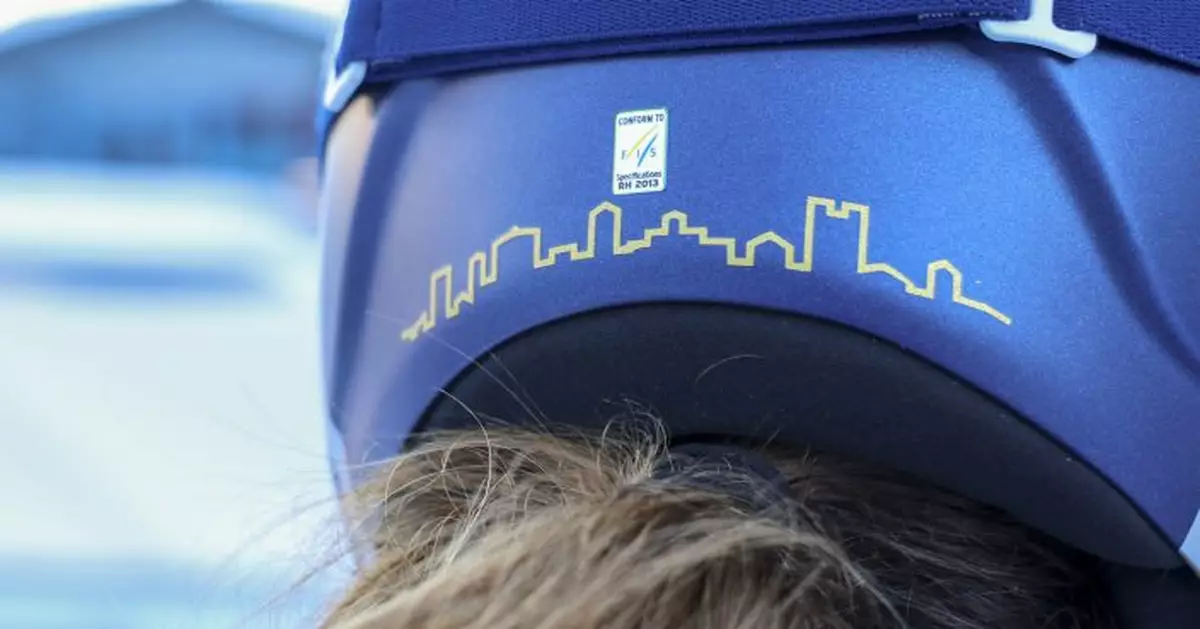The endless cacophony of ambulance sirens. The convoys of military trucks carrying away the overflowing coffins. The funerals — or lack thereof.
Nobody who lived through the initial wave of the coronavirus pandemic in Bergamo — the first epicenter of COVID-19 in Europe — will ever forget it.
For Sofia Goggia and Michela Moioli, the city’s two Olympic champions — Goggia in skiing's downhill and Moioli in snowboard cross — those dark days in March and April 2020 serve as a source of inspiration as they seek to honor the greater Bergamo area's 6,000 dead by defending their gold medals at next month’s Beijing Games.
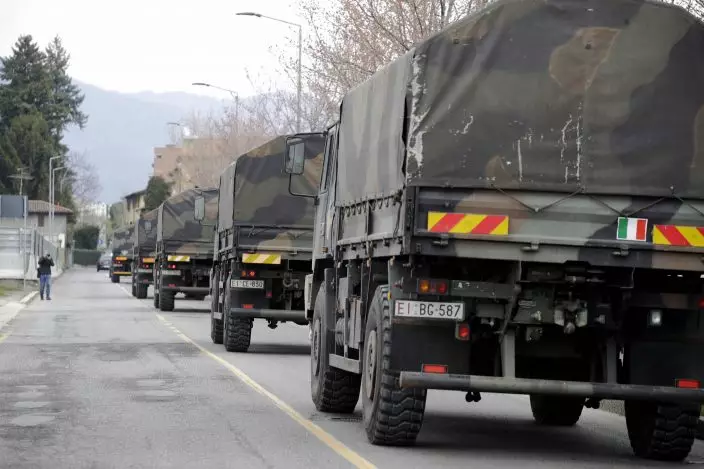
FILE - Military trucks moving coffins of deceased people leave the cemetery of Bergamo, one of the areas worst hit by the coronavirus infection, on their way to a crematory in some other location as the local crematory exceeded its maximum capacity, in Bergamo, Italy, Thursday, March 26, 2020. Defending Olympic gold medalists Sofia Goggia and Michela Moioli both come from the Bergamo area that was the first epicenter of COVID-19 in Europe. Goggia skis with a design of Bergamo's skyline on the back of her racing helmet. Moioli lost her grandmother to the virus. (AP PhotoLuca Bruno, File)
Since last season, Goggia has competed with the outline of Bergamo’s skyline drawn onto the back of her helmet.
“It was hard. I was home for two months. An ambulance would go by every 10 minutes,” Goggia said. “People had terror in their eyes. Terror was everywhere. We were all afraid.”
When Moioli’s grandmother died from COVID-19 in March 2020, the family couldn't hold a traditional funeral because of a strict lockdown. Her grandfather was also hospitalized, for three months, before eventually recovering from the virus.
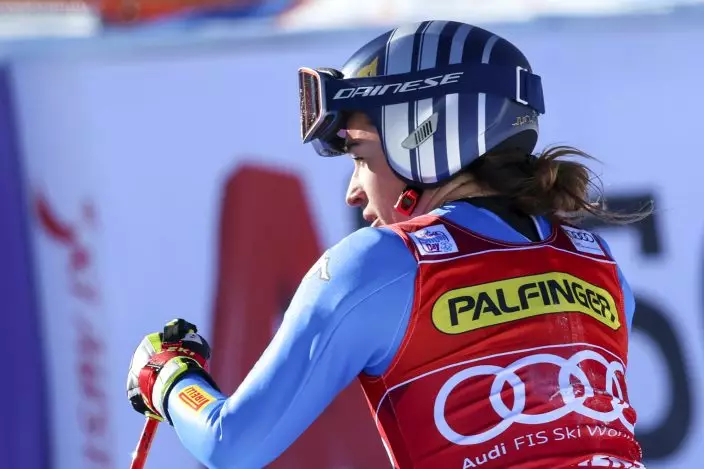
Italy's Sofia Goggia sports Bergamo's skyline on the back of her racing helmet, in the finish area of an alpine ski, women's World Cup downhill race, in Zauchensee, Austria, Saturday, Jan. 15, 2022. Defending Olympic gold medalists Sofia Goggia and Michela Moioli both come from the Bergamo area that was the first epicenter of COVID-19 in Europe. Goggia skis with a design of Bergamo's skyline on the back of her racing helmet. Moioli lost her grandmother to the virus. (AP PhotoMarco Trovati)
“We had a really bad time in 2020 and maybe in that time we learned something and we try to be better — as a person and as athletes,” Moioli said.
The same can be said for the entire Italian team, which is looking to duplicate the country’s unprecedented success at last year's Summer Olympics in Tokyo.
Italy won a record 40 medals in Tokyo and came away with golds from some of the most high-profile events: Marcell Jacobs in the 100 meters, Gianmarco Tamberi in the high jump and the men’s 4x100-meter relay.
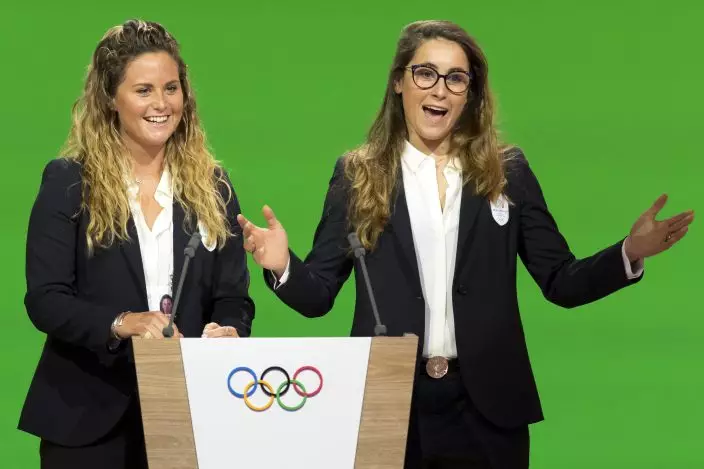
FILE - Italian snowboarder Michela Moioli, left, and Italian skier Sofia Goggia, right, speaking on the podium during the presentation final presentation of the Milan-Cortina candidate cities the first day of the 134th Session of the International Olympic Committee (IOC), at the SwissTech Convention Centre, in Lausanne, Switzerland, Monday, June 24, 2019. Defending Olympic gold medalists Sofia Goggia and Michela Moioli both come from the Bergamo area that was the first epicenter of COVID-19 in Europe. Goggia skis with a design of Bergamo's skyline on the back of her racing helmet. Moioli lost her grandmother to the virus. (Laurent GillieronKeystone via AP, File)
“The Tokyo Olympics gave us the motivation to deal with two endless months of training in the gym,” Goggia said of her preseason preparations.
A banner year for Italy also saw the country’s soccer team win the European Championship and Roman band Maneskin win the Eurovision Song Contest.
“Now it’s our turn,” said Marta Bassino, the defending World Cup giant slalom champion.
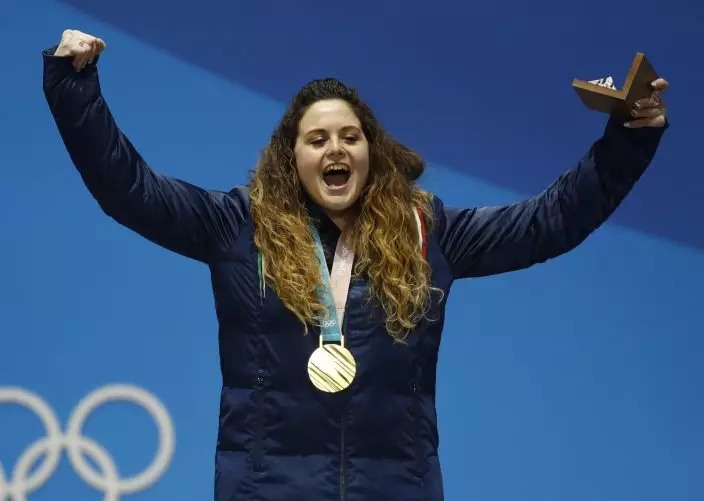
FILE - Women's snowboardcross gold medalist Michela Moioli, of Italy, celebrates during the medals ceremony at the 2018 Winter Olympics in Pyeongchang, South Korea, Friday, Feb. 16, 2018. Defending Olympic gold medalists Sofia Goggia and Michela Moioli both come from the Bergamo area that was the first epicenter of COVID-19 in Europe. Goggia skis with a design of Bergamo's skyline on the back of her racing helmet. Moioli lost her grandmother to the virus. (AP PhotoPatrick Semansky, File)
Goggia, Bassino and Federica Brignone, the 2019-20 overall World Cup champion, give Italy three legitimate medal contenders in skiing, while on the men’s side there’s a top downhiller in Dominik Paris and rising contenders in Luca De Aliprandini for giant slalom and Alex Vinatzer for slalom.
Goggia and Moioli have been selected to carry Italy’s flag at the opening and closing ceremonies, respectively, in Beijing.
When Italian President Sergio Mattarella handed over the green-white-and-red flag to Goggia at a ceremony last month, the skier recounted in an emotional speech the phone call that she received from the head of state after she was ruled out of last season’s world championships on home snow in Cortina d’Ampezzo after breaking a bone in her right knee.
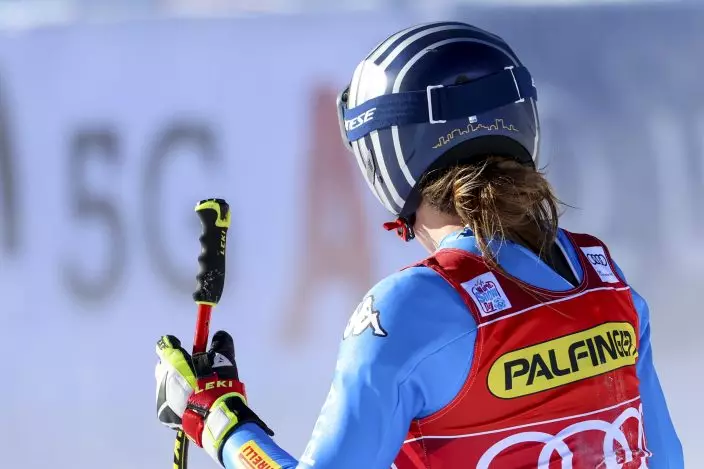
Italy's Sofia Goggia sports Bergamo's skyline on the back of her racing helmet, in the finish area of an alpine ski, women's World Cup downhill race, in Zauchensee, Austria, Saturday, Jan. 15, 2022. Defending Olympic gold medalists Sofia Goggia and Michela Moioli both come from the Bergamo area that was the first epicenter of COVID-19 in Europe. Goggia skis with a design of Bergamo's skyline on the back of her racing helmet. Moioli lost her grandmother to the virus. (AP PhotoMarco Trovati)
“You encouraged me to look ahead toward distant goals, toward Beijing 2022," Goggia told Mattarella. "You encouraged me to dig into my heart and to move forward despite the obstacles in my path and I believe that I’ve done that."
Indeed, Goggia has bounced back to become the most dominant downhill skier since Lindsey Vonn at her peak, including a stretch when she won seven straight downhills that she entered.
“Sofia is determined. She knows exactly what she wants,” said Flavio Roda, the president of the Italian Winter Sports Federation and a former coach of Alberto Tomba. “Winning all of these races consecutively isn’t easy in terms of concentration.”
Whether it was a lack of concentration or just because of too much speed in a dark part of the course, Goggia's winning streak came to an abrupt end in her most recent downhill in Austria on Saturday when she crashed into the safety netting. She came away without any major injuries, though, and was back racing in a super-G the next day.
Moioli, meanwhile, finished third in the World Cup test event on the Olympic course at Secret Garden in November, then posted a victory in Cervinia last month.
Moioli met Goggia while rehabbing her knee after she crashed in the 2014 Olympic final. At the age of 18, Moioli had just surged into third place and contention for a bronze medal when she touched edges with a competitor and fell.
“That moment helped me for my career,” Moioli said. “Step by step, we became really close.”
The close relationship was apparent in 2019 when Goggia and Moioli made a joint speech and dabbed in unison before nearly 100 members of the International Olympic Committee at the voting session for the 2026 Winter Games. Their presentation was later considered vital for Milan-Cortina’s successful bid — winning over voters with their positive energy.
So, naturally, both the skier and snowboarder would like to continue competing through the 2026 Games, when women’s skiing will be contested in Cortina on Goggia’s favorite course and snowboard cross will be held in Livigno on Moioli’s training slope.
Moioli’s duties for the closing ceremony mean that she’ll be involved in the official handover from Beijing to Milan-Cortina. It’s also the first time that Italy has named the flagbearer for a closing ceremony before an Olympics even start.
“It’s a huge honor,” Moioli said. “It’s going to be the link between Beijing and our Games in Milan-Cortina.”
Bergamo will be represented, too.
More AP Winter Olympics: https://apnews.com/hub/winter-olympics and https://twitter.com/AP_Sports
Andrew Dampf is at https://twitter.com/AndrewDampf


